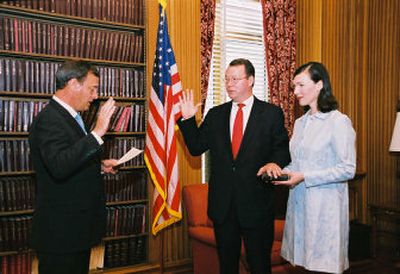Finally, FERC gains regional perspective

It’s summer 2000, and Phil Moeller is working in the Washington, D.C., office of Sen. Slade Gorton, R-Wash. Electricity prices on the West Coast have gone crazy, but the Federal Energy Regulatory Commission does not intervene despite a mandate to assure “just and reasonable rates.” When the agency finally acts in May 2001, prices plunge.
Moeller, who was Gorton’s adviser on energy issues, says the frustration senator and aide shared six years ago has not been forgotten.
Monday, Moeller stood before U.S. Chief Justice John Roberts and was sworn in as the first Northwest native ever to be a FERC member. Moreover, with last Friday’s addition of Arizona’s Marc Spitzer and next Monday’s swearing in of Jon Wellinghoff of Nevada, FERC will have a 4-1 majority of members from the West, the fourth being Suedeen Kelly of New Mexico.
Finally, the agency will have a perspective on energy matters from members knowledgeable about hydropower, the complexities of a transmission grid that stretches from Canada to Mexico, and the special issues raised by the important role played by another federal entity, the Bonneville Power Administration.
“The West,” Moeller says, “has its unique characteristics.” The Northwest even more so.
The westerners hail from states victimized by a FERC blind to the consequences of free-market dogma in a utility world developed under decades of regulation. The electricity crisis of 2000-01 was a disaster FERC could have, at least, moderated.
“We were disappointed in the lack of action that FERC took that summer,” Moeller recalls.
Moeller was raised on a ranch on the south flank of Tower Mountain, and graduated from Freeman High School in 1979. His father, Don, worked from the Farm Credit Bank and was parliamentarian for the Spokane City Council. Moeller says he returns periodically to the ranch, which remains in the family, but it’s been fall since he last visited.
Moeller has been busy. Since Gorton’s defeat in the 2000 election, he has toiled in Washington for Alliant Energy and Calpine Corp. In 2001, he had the dubious distinction of being mentioned semifavorably to the Bush-Cheney transition team for a FERC seat by former Enron Corp. Chairman Ken Lay, who commended his work on electricity deregulation while Moeller was a staffer for the Washington Legislature.
Moeller says he never met or talked with Lay, and he downplays the tenor of the commentary. “They weren’t that crazy about me,” he says.
But Moeller does hold to some of the free-market philosophy that, in the wrong hands, exploded in the face of Northwest ratepayers. If all electricity suppliers had equal access to transmission grids, he says, the nation would have more energy.
“We need to do what we can to build more infrastructure,” Moeller says.
That means not just wires, but pipelines to transport natural gas from new sources like Alaska, and ports that can handle imports of liquefied natural gas. Thanks to last year’s energy bill, FERC has beefed up authority to set rules for transmission safety and reliability. Members will also revisit dam relicensing, where utilities and environmental groups have waged expensive struggles to find the proper balance between power generation and preservation of the natural resource.
They will also investigate Enronesque market manipulation, and assure proposed utility mergers are in the best interest of consumers.
Moeller says the commission will respect state concerns as members formulate new policy. That sensitivity was not shared by some of the outgoing members, who seemed bent on imposing one-size-fits-all rules on electricity systems with far different operating requirements.
Moeller will have the benefit of strong bipartisan backing as he undertakes his new duties. Though a Republican, Washington Democratic Sens. Patty Murray and Maria Cantwell rhapsodized about him during confirmation hearings. Rep. Cathy McMorris, R-Wash., praised him in the House of Representatives and attended his swearing in.
Getting Moeller on the commission is a big deal for the Northwest. Although it’s not his place to become a regional advocate, he will certainly bring the region’s sensibilities to FERC deliberations. That’s all we could have hoped for.